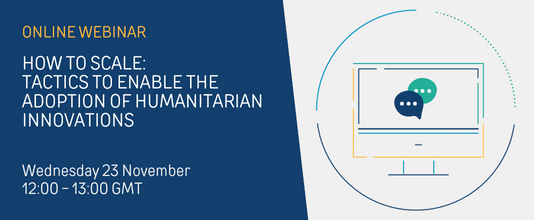Post
Published on November 3, 2022
ELRHA will be launching the third paper in its series on scaling up humanitarian innovations at an online event on November 23, 2022.
The new learning paper, “How to Scale: Tactics to Enable the Adoption of Humanitarian Innovations”, provides a playbook of tactics for those aiming to scale up humanitarian innovations by enabling organizations to adopt their innovations.
The report draws on lessons learned in the scaling journey of several ELRHA-funded humanitarian innovations, including the Dahdaleh Institute’s own Safe Water Optimization Tool. The report features a foreword by Dr. Syed Imran Ali, Dahdaleh research fellow and lead on the Safe Water Optimization Tool project.
Date: Wednesday, November 23, 2022
Time: 8 to 9 a.m. ET
Location: Online via Zoom
The event is open to everyone to attend.
To register, please visit the ELRHA event page here.

Themes | Global Health & Humanitarianism |
Status | Active |
Related Work | |
Updates |
N/A
|
People |
You may also be interested in...
Announcing the Winners of the 2023 Seed Grants in Critical Perspectives in Global Health Research
Following the fourth annual Critical Perspective for Global Health Research (CPGH) workshop in March, the CPGH Steering Committee is delighted to announce that the following York researchers have been awarded this year’s $5,000 seed grants ...Read more about this Post
York U’s state-of-the-art emergency and disaster simulation lab with Emergency Operations Centre a multifunctional first
Originally published by News@York (3 July 2024) The launch today of the Victor Phillip Dahdaleh Advanced Disaster, Emergency and Rapid Response Simulation (ADERSIM) Lab and Emergency Operations Centre is thanks to some $3.5M in private ...Read more about this Post
Don't Miss Our November Lineup of Events
Join us for a November packed with insightful seminars, inspiring guests, and the launch of SWOT v2. Start off the month with a public seminar by visionary designer and Dahdaleh Institute community fellow Bruce Mau. ...Read more about this Post
